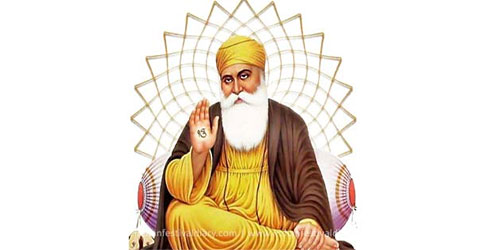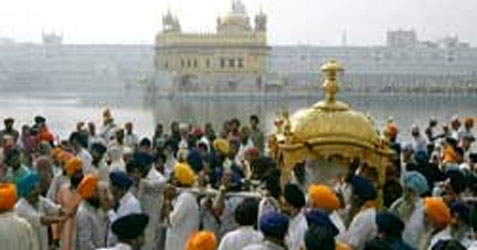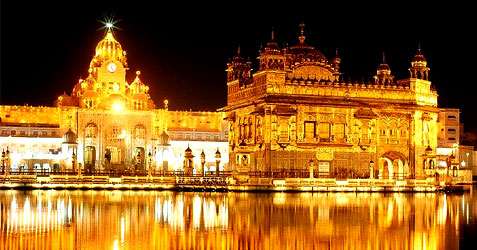


Guru Nanak Jayanti 2025
Guru Nanak Jayanti is the birthday of first Sikh Guru, Guru Nanak, and one of the most sacred festivals in Sikhism.
The festivities in the Sikh religion revolve around the anniversaries of the 10 Sikh Gurus. These Gurus were responsible for shaping the beliefs of the Sikhs. Their birthdays, known as Gurpurabs, are occasions for celebration and prayer among the Sikhs. Gurpurabs are part and parcel of Sikhism. In history we see that the Sikhs have to sacrifice even their lives in order to celebrate the Gurpurbs. Whether it is DIwali (Bandi Chhor Diwas), Vaisakhi (Khalsa Sajna Diwas), or Martyrdom day of Guru Arjan Sahib (Sahidi Diwas), Sikhs gather and remember their Gurus & pay homage to the great Martyrs. All the Gurpurbs are celebrated with great fervor & enthusiasm by the Sikhs throughout the world.
Guru Nanak Dev Ji (the First Guru, the founder of Sikhism) was born on 14 April 1469 in Rai-Bhoi-di Talwandi in the present Shekhupura District of Pakistan, now Nankana Sahib. The birthday of Guru Nanak Sahib falls on Kartik Poornima, i.e., the day of the full moon in the month of Kartik. In the Gregorian Calendar, the birthday of Guru Nanak usually falls in the month of November, but its date varies from year to year, based on the traditional dates of the Indian calendar.
The birth-day celebrations & Gurpurbs of Guru Sahibs usually last for three days. The celebration is generally similar for all Gurpurabs; only the hymns are different.
Generally two days before the birthday, Akhand Path (a forty-eight-hour non-stop reading of the Guru Granth Sahib, the holy book of the Sikhs) is held in the Gurdwaras.

The day prior to the birthday, a large procession (Nagarkirtan) is organised which is led by the Panj Pyaras (Five Beloved Ones). They head the procession carrying the Sikh flag, known as the Nishan Sahib and the Palki (Palanquin) of Sri Guru Granth Sahib. They are followed by groups of kirtani Jatha, Various School bands and students, eminent Citizens, teams of singers singing hymns from Guru Granth Sahib in chorus, brass bands playing different tunes, 'Gatka Teams' (Martial Arts) display mock-battle with the traditional weapons and display their swordsmanship, and devotees. The procession pours into the streets of the town which are covered with buntings and decorated gates for this special occasion. The passage of the Nagarkirtan is decorated with flags, flowers; religious posters decorated gates and banners depicting various aspects of Sikhism. The leaders also spread the message of Guru Nanak.
On the day of the Gurpurab, the day begins early in the morning at about 4:00 A.M or 5:00 A.M. with the singing of Asa-di-Var (morning hymns) and hymns from the Sikh scriptures followed by Katha (exposition of the scripture) together with lectures and recitation of poems in the praise of the Guru. Kirtan-Darbars and Amrit Sanchar ceremonies are also held in the Gurdwara hall. Following that is the Langar or special community lunch, which is arranged at the Gurudwaras by volunteers. The idea behind the free communal lunch is that people should be offered food in the spirit of seva (service) and bhakti (devotion).
Guru Nanak Jayanti is celebrated by the Sikh community all over the world and is one of the most important festivals in the Sikh calendar. The celebrations are especially colourful in Punjab and Haryana.

The son of a Kshatriya (warrior) family, he studied Hinduism and Islam. He got married but then he abandoned his family and became an ascetic. Wandering for many years he came under the influence of both Hindus and Muslims (especially Sufi). The Muslim teacher Kabir (died in 1398) made a deep impression on Guru Nanak. He began preaching, "There is no Hindu, there is no Mussulman."